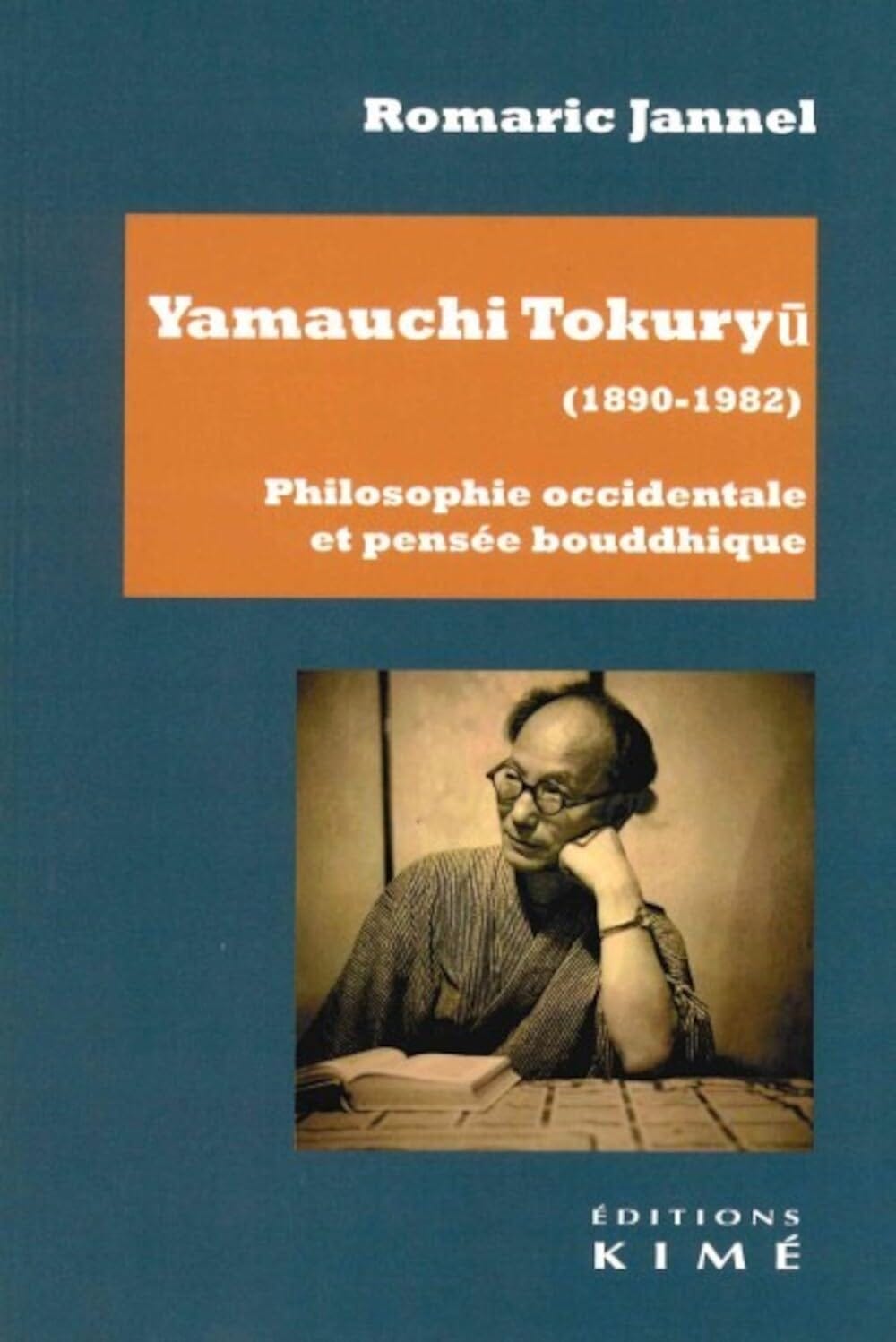Discussing Aristotelian logic, Nāgārjuna, and pure randomness as key ingredient for free will...
with French philosopher, Romaric Jannel.
I’m so happy to introduce you to French philosopher, Romaric Jannel, in what will hopefully be an ongoing series featuring philosophers on Substack. He is the author of a book in French entitled Yamauchi Tokuryū (1890-1982). Western Philosophy and Buddhist Thought (2023), the first ever study of this philosopher:
Have you ever abandoned a position that you strongly believed in? What made you change your mind?
ROMARIC JANNEL: First of all, thank you very much for inviting me to this interview. Asking me if I have ever abandoned a position that I strongly believed in is quite a question to begin with. It obviously takes into account the strange and sometimes accurate image that philosophers have. In short, the answer is yes. My approach to philosophical questions should probably be considered “scientific” in the sense that if evidence or arguments go against one or more of my views, I will reevaluate the whole question, paying close attention to opposing elements.
I did this, for example, at the beginning of my doctoral research. My research, based on the philosophy of Yamauchi Tokuryū, was on the logical determination of thinking. My question was more or less what principles guide us in our investigations, principles that come from our way of interacting with things, and to see if we can change or modify these principles, for example, using some old Indian views. My preconception was mostly that Aristotle was bad in his definition of the principles of identity, (non)-contradiction, and excluded middle. During my master’s research, I thought that Aristotle was wrong to state such narrow and stubborn principles. My conviction was based less on the work of Aristotle himself than on the critics of his work, some of whom became famous for their criticism.
However, after a detailed search in Aristotle’s philosophy, I discovered that most philosophers, when commenting on Aristotle, did not take into account some parts of Aristotle’s writings that give meaning to his logic and establish its usefulness AND limitations. This changed the perspective of my doctoral research, which was to compare the usefulness and limitations of different “modes of logical thought.” I used this expression to indicate that my work was about logical systems, but without presupposing that these logical systems were really consistent or not, really rational or not, really efficient or not. This made me both a critic of Aristotelianism (a poorly informed version of Aristotle’s views) and an appreciator of Aristotle’s philosophy in general, who was certainly a man of his time (yes, there are problems) but also a rather brilliant scholar in a strong sense.
TINA: A good reminder that we shouldn’t put too much trust in secondary sources! I think that’s especially true for Aristotle, who can be more nuanced than people realize. Can you give an example of how you compare different “modes of logical thought”?
ROMARIC: This is a rather difficult question to answer simply. What I have compared most is Aristotle’s formal logic and Nāgārjuna’s tetralemma. The question was, for example, is there an object of thought that cannot be grasped by a strict application of the principle of contradiction? Let’s take an object like a golden statue of an apple. Aristotle would consider it a statue, not a real apple. But some Indian logicians held a different view. The tetralemma, which was widely used in India and especially in Buddhist rhetoric, recognizes as logically legitimate statements such as “This object [taken at the same time and from the same perspective] is both an apple and not an apple.” What authorizes such a statement? Moreover, are there objects of knowledge that cannot be grasped by Aristotelian logic, but only by a clear recognition of biaffirmative or binegative accounts?
Similar insights borrowed from Buddhist logic can be found in the work of Graham Priest. But to me he was more concerned with appearing original as a philosopher and supporting his own views. He has not read either Aristotle or Nāgārjuna carefully enough to see the internal coherence of both approaches. In the end, such a logical discussion led to a metaphysical discussion of the nature of things, including classical notions such as: substance, essence, causation (i.e., the dynamic account of reality), and the nature of what thinking is and of who thinks.
Find out more: Nāgārjuna’s Tetralemma in Yamauchi Tokuryū’s Philosophy
What philosophical view do you secretly hope is wrong, despite finding the arguments for it compelling?
ROMARIC: There is one position that I would like to be wrong about, but I do not have the argument that would end the argument. I am against absolute determinism. I have a personal reason for this. I became a philosopher despite growing up in a poor, rural, single-parent family. In a deterministic world, I think I would not have been able to become a researcher who is invited to different countries to talk about difficult philosophical issues. And yet I believe, more or less improvably, that there is no puppet master acting on a cosmological level. Part of my work is to consider pure randomness as something important at a fundamental level, opening the door to a world with many determinations and tensions that affect us, but also a door to a physically based self-determination.
Nietzsche, for example, in Beyond Good and Evil, talked about what are the elements that push philosophers into their own position (see my post entitled “Philosophers’ Testimonies of Themselves”). My own life has long been a strong motivation and source for my thinking. But as the German philosopher explained, philosophers must question their preconceptions, which should naturally lead to a kind of scientific attitude.
TINA: Well, I’d say you were destined to become a philosopher! But I’m curious what you think. If the world is not deterministic, is that incompatible with a “puppet master”?
I’d love to hear more about your work on “pure randomness” and “physically based self-determination”. Can you elaborate? Is pure randomness linked to free will?
ROMARIC: Most accounts of free will assume that something arises out of the complexity of the human mind or the complexity of life that gives the human or living being something that the physical elements do not have, the very possibility of freeing itself from a mechanistic nature. However, just as there is no clear definition, at least other than a normative one, of what life is and what distinguishes living beings from non-living beings, there is no clear view of what would really make a human or living being free from a wholly determined mechanistic world. This also seems to authorize researchers like Turing Prize winner Judea Pearl to think that free will is just a useful illusion. You can watch the video below to see what he means.
But my guess is that free will comes not from a certain level of complexity or from life itself, but from something that creates space for free will in nature itself: randomness. This is not to say that free will comes from randomness alone, but that randomness may be a key ingredient for free will. Of course, this is a position I have developed in some lectures, but it needs to be improved.
Anyway, to get back to your question, if that were the case, would the idea of a puppet master be dismissed? Not really. That is the strength of absolute determinism, it can neither be denied nor proven for obvious reasons, it is impossible to have proof of the necessities that would determine all the small elements of the universe to be as they are in the next moment, just as it is impossible to have proof that when we see something that seems random there is no determination that we ignore or cannot grasp. Then my question is merely, what if?
Are there any philosophical questions that will never be resolved? Why?
ROMARIC: I would say yes to your question, but the answer should be detailed.
There is the old idea, which we inherited from the ancient Greeks, that nature is understandable; something that Heisenberg criticized. It is common to see such a belief in the intelligibility of nature as a necessary belief. A belief without researchers would not do research. But for me it is just one belief among others; a belief that René Descartes questioned and that Kant radically criticized. And it only serves to feed human hubris. At least, I do not need it to do research.
The thing is, even if some questions are impossible to answer, that does not mean we should not try. In many cases, when we are looking for something specific, we find something else that is important. Sometimes it tells us why we cannot now or in the future solve the very question we were working on, sometimes it gives us elements to consider in another inquiry, sometimes it gives us nothing really useful but will help someone else in his or her research.
This last element is perhaps the most important of all, if we are modest enough to consider research, whether philosophical or not, as a collective adventure for the sake of human beings and living beings in general (including pleasant and unpleasant beings like insects, bacteria, and viruses).
TINA: “The thing is, even if some questions are impossible to answer, that does not mean we should not try”—Is this attitude what led you to the philosophical path? Or was it more of an interest in a particular topic or question?
ROMARIC: If you mean in philosophy and not in science, the answer is yes to both questions! There are fundamental questions that a strictly scientific approach cannot answer because there is no empirical data to deal with. Moreover, there are approaches that we can take not only for scientific reasons, but also to test where they might lead in terms of ethical and political implications. I think philosophers are better equipped to do this, to push concepts to their limits, than scientists.
Experiments are not just something you do in some fancy lab. They begin in people’s minds and they end in people’s minds. Scientists and philosophers both do experiments. But we philosophers are less bound by the need for empirical proof. In many cases, philosophers should be more aware of empirical data, but there are some thought experiments that need to be done as rational objects without a clear empirical ground, at least as a first step. This is what philosophical scientists like Einstein, Schrödinger, and Bohr did. At a certain level of speculative inquiry, the distinction between philosophy and science, which is a modern creation, disappears.
What do YOU think?
Is the law of non-contradiction too binary? Is randomness a key ingredient for free will?
ROMARIC JANNEL is a French philosopher who has been living in Japan since 2016. He is currently affiliated with the French Collège International de Philosophie (founded in Paris by Jacques Derrida and his colleagues) and Ritsumeikan University (Kyoto, Japan). He received his Ph.D. in philosophy from the École Pratique des Hautes Études (Paris) in 2020. He is the author of a book in French entitled Yamauchi Tokuryū (1890-1982). Western Philosophy and Buddhist Thought (2023), the first ever study of this philosopher. He has also published several academic papers on metaphysics, logic, and environmental philosophy. He has recently begun editing the Japanese philosophy section of the Internet Encyclopedia of Philosophy, which will offer readers the best of Japanese philosophy research in an accessible form.
You can customize which bits of this newsletter you receive by visiting your account.
To get full access to my published books and posts, upgrade your subscription. Find out more.
Thanks for supporting my literary endeavors and off-beat philosophical speculations. Cheers!
—Tina










An actual interview with a renowned philosopher is a great addition to your substack. Kudos to you girl.......
The example Romaric used of the statue of the golden apple is an accurate depiction of how Buddhist logic employs Nāgārjuna’s tetra-lemma. However, it must be pointed out that this modality of four possibilities to any proposition is a perversion of the tetra-lemma, and as a modality of logic the tetra-lemma was never intended to be used in this way. It was designed by Nāgārjuna to deter otherwise determined monks from trying to build an intellectual construction of the ultimate reality. With that purpose in mind the modality of the tetra-lemma works like this:
A proposition is neither true nor is it false and... it is neither not true and it is neither not false.
As a modality of logic, what the tetra-lemma was designed to do was to provide an alternative or third lemma to the binary alternatives of either a true or false answer to any proposition. And that third alternate or third lemma is "I don't know".
Great topics. I like the approach to randomness and free will. Will have to check his work. Meanwhile, this paper might add some further food for thought:
https://doi.org/10.53765/20512201.30.5.032